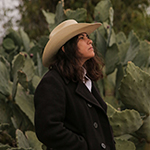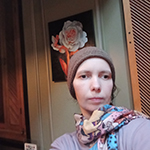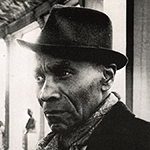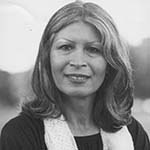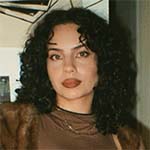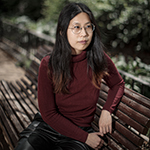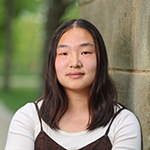Always Yours, Summer 2024 Letters
“of what future are these the wild, early days?” – Kyle Tran Myhre
Dear beloveds:
Today I am listening to the [ ] Police Department scanner while I watch goats nibble on buckthorn out the window. I am cross-stitching and three of the goats are not tethered so I am responsible for them, well, not running away. Like us, however, they are very social creatures and tend to desire company. So, it’s most likely fine.
I’m telling you this because I feel I am split between two worlds. Not merely the rural/urban divide, though that is quite tangible. No, I am listening with one ear to the constructed world of death-making and surveillance while, with another, I am listening to the sound of contented munching, of something real and visceral and of this place I call home for the moment. I am making something with my hands and I am thinking about what seeds are being planted across the road. At the same time, I am fully surrounded by those systems of devastation: I am living in a food apartheid zone, where the nearest place for food is a gas station and the closest market is 25 miles away. The “Big Agriculture” potato farming corporation has planted rows and rows of monocrop as far as the eye can see in some places, and giant, tank-like pesticide sprayers roll down the highway in front of me when I drive. A helicopter passed over us just the other day, dumping something across the fields.
____
I just finished reading the book not a lot of reasons to sing, but enough and I’ve been sitting with that, as well. It’s a book of poetry with a plot: two poets (one human, one robot) are traveling around the moon prison colony, watching the early stages of a revolution and reflecting on the first revolution of their history. In this reading, I wonder, what future are we co-creating? What does it even mean to think about the future, when the present is a devastation?
____
We know there aren’t two worlds. It’s just this one, with its utter grief and its joy. There is the genocidal police state and what we do to stop it. They exist together, for now. So I’ll keep both ears listening, waiting for what I need to hear.
Yours,
E
“WATCH OUT BE PREPARED YOU ARE LIVING IN THE BELLY OF THE BEAST we are waiting in exile from the future we are here to save each other we are poised on the knife edge of the abyss the dead and all the living walk beside us in an unending search for an elusive horizon…”
Dear beloveds:
I have rewritten and rewritten this letter several times, in a fruitless search for the perfect words—which, of course, do not exist. The body is too material to hold all this grief, words too static to hold this anger. Today I woke up to the death toll in Palestine, by which I mean I had the luxury of waking up. Of this water, this cup in my hands. And I don’t know what else to say, you know? All the words have been spoken, and I am thinking about how we speak with our bodies. How that is the only way, the only way we get out of “exile from the future,” how we honor the past, how we even attempt to grasp at the present. And, of course, you all know this. I am thinking about:
“how to say resistance. how to say what do we owe
and these streets. not ours until— and the silence. the clockwork
of response. there is no grit but this, under our fingernails. speak
these two hands and our feet on the pavement, at the very least.”
I am thinking about what [ ] said this week: “I am more afraid of their choices than I am of mine.” This stuck in my chest. I am more afraid of their choices than I am of mine. It’s something I think we all carry with us, knowing all of you. It is at the core of why we act, despite the power of our enemies. Despite the fear.
Or, maybe, because of the fear. Because fear is proof that we love something, someone, with every fiber of our beings. That we love hard, and love deep.
I have been sitting with this poem posted on Twitter (fuck you Musk, I’m not calling it X), that I quoted at the top of this letter. The author goes on to say, “what are we waiting for the kingdom of the dead breathes down our throats” and god, I cried. We are living in the belly of the beast, in the heart of death-making, and I am quite literally in the “heart” of it right now. The rural Midwest carries so much beauty and depth, and also scares the shit out of me.
On one hand, I am surrounded by kindness in a way that I don’t experience in general in [ ]. There is a group of elders here who meet once a week. They share a potluck feast and talk about their experience of their mothers, their hip surgeries. One coaches a robotics team; another is planning to teach [ ] how to knit. They barely knew my name before they were offering me food and a place to sit, to hear their stories. They asked if I would be okay in the rain later that day and how the goats were doing.
On the other hand, I went to a rodeo (a sentence I never thought I would say) and I am ashamed to say that I stood during the national anthem because [ ] reminded me that we would be physically endangering the interns if I didn’t. I felt disgusted as they paraded a Big Agriculture flag around on horseback during the advertisement section (because, yes, at a rodeo they advertise to you on horseback). And, the owners of the rodeo arena gave their land for free to the water protectors in 2021. They offered space to camp and still hold events where they cheer “water is life” and “love water not oil.” They host potentially The Most American thing besides bombings and coups, and yet they also supposedly support LandBack.
Days later, I sit with [ ]’s grandchildren on a hot afternoon and play pretend. We dream up stories about princesses and evil witches, where the princesses save their people but the witches steal their land — but the princess promises to get it back someday. This does not feel like pretend anymore. I pitch my voice and I think of the teachers in Palestine, doing the voices and refusing the shaking of the ground. I think about the promise of liberation and I want it to be real for them, for these girls, for all of us.
Last week, hope felt tangible. This week it is a discipline. This week it is a practice. And this letter hasn’t done a perfect job of that practice, has it? I guess it’s more real this way. But I’ll leave you with one thing that my heart has held lightly.
I am staring at a pile of pure orange kittens, birthed by a cat whose name we do not know. They are small and fragile and squirming with a slight dusting of fur. They stick close to each other, and have been carried by their mother into the floor level cabinet of the cabin where I’m staying. We put a blanket in there, to protect them from the splinters and the styrofoam cups that make up their current interior design. I am staring at this pile of kittens, two weeks or so old now, and they are valiantly trying to move towards the cupboard door, sticking one paw on the ground whenever I open it. They quickly retract the paw upon meeting the cold floor, and squirm back to their pile. Their eyes are just barely open and I can hold each one in the palm of my hand, but they quickly become a little ball of mewling when I try. I have seen them take their first steps and know that, soon, they will be underfoot.
I am scared for them but, again, fear is proof we love something, right? I’m scared for you all, as I know you keep fighting in what ways you can. But that’s proof of something, I know.
Yours,
E
Dear beloveds:
I have been opening this document to write to you for weeks now, always stumbling over the words. To be blunt: I’ve got to get over myself. Because of that, some of this will be fragmented, snippets from weeks past that still speak to me in some way. So it goes, I suppose.
Two weeks ago, I wrote: I have stayed on this farm longer than I intended and will be returning to [ ] sooner than I intended. The longer I am here, the more I think of you. The longer I am away, the more I wish to take up what I have learned and bring it to you with open hands. Besides, I am afraid my car may break down if I were to continue to journey north. Such is the way of inheriting a car. Such is the way of remembering there is always work where you are.
(Well, dear readers, guess what? My car did break down! But I’m safe, I promise, after a good cry on the side of the road. And a call to my mother.)
“History is a kind of study. History says we forgave the executioner. Before we mopped the blood we asked: Lord Judge, have I executed well? Studies suggest yes. What the [ ] are you crying for, officer? the wire mother teaches me to say, while studies suggest Solmaz, have you thanked your executioner today?” – Solmaz Sharif
The third week of July, I wrote: I am angry and out of graceful words. Too many people are thanking their executioners on Twitter. Or, put another way, so much has happened since last I wrote; so much stays exactly the same. I find myself opening the app and watching the world through the mediation of likes and reposts, watching the meme-ification of genocidaires and the callous re-sharing of murder videos. The empire continues its machinations and I open another app. I open another app and, my god, how empty it feels to be connected only through a screen. How empty it is to be full of rage.
I wanted this letter to be something beautiful. I wanted to give you something of myself and the woods here, something of the goats and their absurd joy. As if words were something I could hold in my hands and offer to you in place of my absence. But this week I am angry and those words feel just out of my grasp. I figured it’s better to be honest, anyways.
Last week, a child ran away again. Her story is not for me to tell but I will tell you mine. The week before, the cops came to our door and asked for her by name. I found her, half an hour later, in [ ]’s home. I sat with her for hours; I made her a sandwich and she was too hungry for it. Eventually, she asked me to take her back. We can only communicate via Instagram and this week, I hope for a new post. This week, I sit on the dock and wish she could be here. I check my phone, I check my phone, I check my phone and—
I work on social media for [ ] and I worry for her, even as I am angry with her for ignoring and somehow simultaneously overworking the interns. I explain the non-profit industrial complex to one [ ] and she looks even sadder. I take her for coffee and she cries. I cry with her, angry at the way we are imperfect in enacting our beliefs and how we hurt each other. Angry at… well, again, how empty it feels to be so full of rage.
So, I hold her hand. We sit in a coffee shop, and I think about Franny Choi’s words:
In lieu of proximity to firefighters; in lieu of the ability to speak the airlesss language of ghosts; or to reverse the logic of molecules; or to force Exxon to call the hurricane by its rightful name; or to convince my friends not to launch themselves from the rooftops of every false promise made by every rotten idol; in lieu of all I can’t do or undo; I hold.
I sit in that coffee shop, on that dock, next to the goats while I feed them grain for the last time, in the car by myself, in each meeting with so many of you, in every moment of grief, I hold. Or, I try, at least. Whatever it may mean, in those times. However metaphorical. However tangible. In trying, I am reminded, over and over again, that I need to stop orienting towards our executioners. Not merely in the explicit, the external, but in every facet of my being. To kill the cop in my head means to stop letting my anger overtake my capacity to function. I said that I was out of graceful words, and that still feels true, but I want to practice life in the midst of so much death-making, as people resisting all over the world teach us. So I will reach for those words, with whatever imperfection comes. And I know I’m not alone.
My final day there, three of us went onto the lake. We paddled and rowed and I tipped the kayak over, trying to go swimming. I kept working to get the water out, flipping it this way and that, jumping into it and hitting my knees against the hard plastic. They, laughing, reminded me that the dock was right there, I just had to wade through the algae. At the risk of using an overdone metaphor, I think I’m finally understanding that the dock is there, with all of you.
I am now en route to [ ] and I’ve seen four (4!) rainbows on the road. I made the obligatory “I love being queer” joke to myself but I’m also trying to hold onto what is beautiful. What is life-giving, at this moment. What I mean to say is, how grateful I am to be alive at the same time as you. How grateful I am to remember that I just have to reach out. That we hold each other.
Always yours,
E
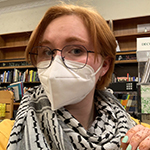
Em Roth (they) is an educator and organizer in Boston. They believe in the promise of liberation and are enamored with the way that goats look in the sunset. If you are moved in any way by their work, they encourage you to donate to https://gazafunds.com/. Their poetry has been previously published by beestung, BRAWL Lit, and the B’K.

 BACK TO ISSUE
BACK TO ISSUE
